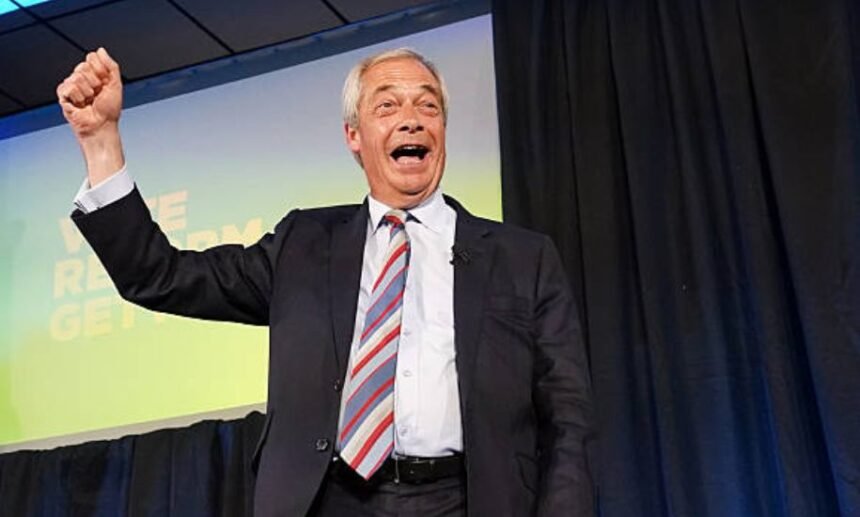Nigel Farage is a name that has become inseparable from the story of Brexit and modern British politics. Known for his outspoken style, sharp debating skills, and ability to connect with voters frustrated by mainstream politics, Farage has carved a reputation as both a disruptive force and a political pioneer. Over the decades, he has built a career not only as a politician but also as a media personality, businessman, and commentator whose influence stretches far beyond the UK.
This detailed article explores Nigel Farage’s age, personal life, spouses Kirsten Farage and Gráinne Hayes, his children Thomas, Samuel, Isabelle, and Victoria Farage, as well as his net worth. Alongside these personal insights, we will reflect on his political career, controversies, and the legacy he continues to build.
Early Life and Background
Nigel Paul Farage was born on April 3, 1964, in Farnborough, Kent, England. Growing up in a typical middle-class English family, he experienced both stability and challenges. His father, Guy Farage, worked as a stockbroker, while his mother, Barbara, was a homemaker. However, his childhood was not without turbulence, as his father struggled with personal issues, including alcoholism.
Despite this, Nigel Farage developed into a strong-willed and ambitious young man. He attended Dulwich College, a prestigious independent school in London, where he quickly made a name for himself. Teachers and peers often noted his confidence, boldness, and willingness to challenge authority—traits that would follow him into politics.
Unlike many politicians who pursue university, Farage took a different route. After completing school, he entered the world of finance, working as a commodities trader in the City of London. This job introduced him to negotiation, risk-taking, and public speaking, laying the groundwork for his political career.
The Beginning of Political Life
Farage’s political journey officially began in the early 1990s when he co-founded the UK Independence Party (UKIP). He was motivated by a strong opposition to the UK’s deepening integration with the European Union. Unlike many traditional politicians, Farage was unapologetic, direct, and charismatic—qualities that set him apart.
In 1999, Farage was elected as a Member of the European Parliament (MEP) for South East England. He would hold this position for two decades until the UK officially left the EU in 2020. During his time in Brussels, Farage became famous for his fiery speeches in the European Parliament, often criticizing EU bureaucracy, overreach, and what he viewed as a loss of national sovereignty.
Leadership of UKIP
By the mid-2000s, Farage had become the face of UKIP. In 2006, he was elected leader of the party. Under his leadership, UKIP grew from a fringe movement into a mainstream political force. The party’s popularity surged among voters who felt ignored by the traditional Conservative and Labour parties.
UKIP’s major breakthrough came in 2014, when it won the most seats in the UK during the European Parliament elections. This unprecedented success put enormous pressure on Prime Minister David Cameron, eventually leading to his promise of a referendum on EU membership.
Farage’s relentless campaigning, particularly his ability to connect with working-class voters, played a decisive role in the 2016 Brexit referendum. The victory for the Leave campaign was arguably the crowning achievement of his career and reshaped the UK’s political landscape forever.
Reform UK and Later Career
Following Brexit, UKIP’s influence declined. Farage eventually left the party, frustrated by its direction. In 2019, he launched the Brexit Party, which was later rebranded as Reform UK.
Reform UK positioned itself as a voice for voters dissatisfied with traditional parties and government handling of Brexit and other national issues. Farage, once again, became the leading figure of the movement, pushing for policies on sovereignty, immigration, and reduced bureaucracy.
By 2024, Farage had returned to frontline politics, winning a seat as a Member of Parliament (MP) for Clacton. This victory cemented his comeback and demonstrated his continuing influence.
Nigel Farage Age
As of 2025, Nigel Farage is 61 years old. Despite his age, he remains one of the most energetic and vocal figures in British politics. His ability to stay relevant after decades in the public eye speaks to his adaptability and media-savvy personality.
Personal Life: Spouses and Children
Nigel Farage’s personal life has often attracted public attention, particularly his marriages and family relationships.
- First Marriage: In 1988, he married Gráinne Hayes, an Irish nurse. Together, they had two sons:
- Samuel Farage (born 1989)
- Thomas Farage (born 1991)
The marriage ended in divorce in the late 1990s, but Farage has remained a father figure to his sons.
- Second Marriage: In 1999, Farage married Kirsten Mehr (Kirsten Farage), a German national. They had two daughters:
- Victoria Farage (born 2000)
- Isabelle Farage (born 2005)
Farage and Kirsten eventually separated in 2017, though they shared over a decade of marriage and family life.
Farage has balanced his demanding political career with family commitments, often acknowledging the challenges of being in the public spotlight while raising children.
Nigel Farage Net Worth
Nigel Farage’s net worth is estimated between £3 million and £4 million as of 2025. His wealth comes from multiple sources:
- Political Career: As both an MEP and MP, Farage earned salaries and allowances over two decades.
- Media Career: He has hosted shows on networks like GB News and has appeared as a political commentator on global platforms. His charisma and controversial nature make him a sought-after media guest.
- Business Ventures: Farage owns companies involved in public speaking, broadcasting, and consultancy.
- Public Appearances & Speaking Engagements: He frequently gives speeches worldwide, earning substantial fees.
- Television Appearances: His participation in reality and entertainment shows has also boosted his income.
His ability to convert political influence into financial success highlights his versatility.
Public Image and Controversies
Nigel Farage’s career has been filled with both admiration and criticism.
- Supporters view him as a man of the people, unafraid to challenge elites and mainstream politics.
- Critics argue that his rhetoric has at times been divisive and overly populist.
Farage has survived controversies ranging from political statements to scrutiny of his finances. Yet, his resilience and ability to command media attention have kept him in the spotlight.
Legacy and Historical Impact
Few modern politicians have influenced British politics as much as Nigel Farage. His role in the Brexit referendum alone secured him a place in history. He has inspired both admiration and opposition, shaping debates around immigration, sovereignty, and national identity.
Whether one supports or disagrees with him, Farage has been a transformational figure whose influence will be studied for years to come.
Conclusion
Nigel Farage’s life is a story of determination, controversy, and lasting impact. From his beginnings as a commodities trader to becoming the political face of Brexit, his journey has been extraordinary. With a family that includes four children—Thomas, Samuel, Isabelle, and Victoria—and two spouses in his past, Kirsten Farage and Gráinne Hayes, his personal life is as layered as his public one.
At 61, with an estimated net worth of several million pounds, Farage remains a relevant and influential voice in UK politics. His ability to reinvent himself—from politician to media figure and back again—ensures that his presence will continue to shape national debates.
For readers interested in more in-depth profiles of global political figures, Daily spectrum provides rich, detailed insights into the lives of leaders shaping our world today.






